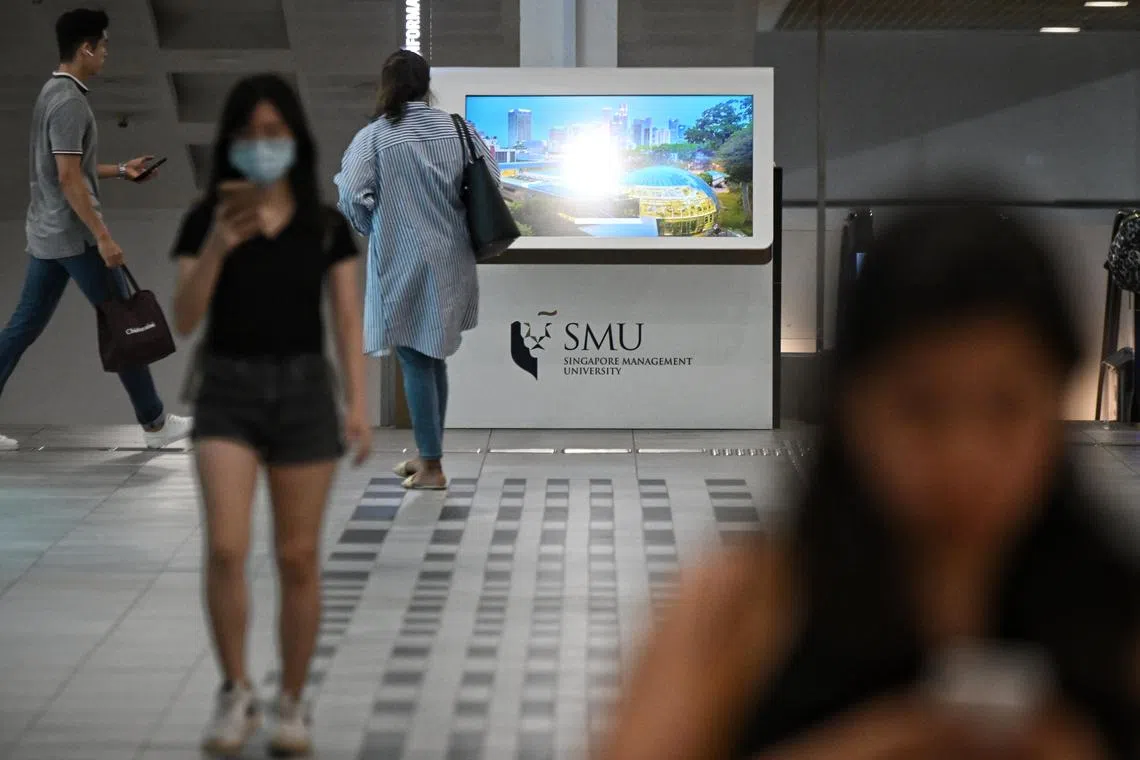SMU law students can now opt for specialisation track
Sign up now: Get ST's newsletters delivered to your inbox

SMU is the only law school in Singapore to offer the specialisation tracks for students.
ST PHOTO: KUA CHEE SIONG
SINGAPORE – Law students at the Singapore Management University (SMU) who wish to specialise can now do so in corporate transaction, law and technology, or dispute resolution – three tracks that are tailored to better prepare them for employment.
SMU also announced on Thursday that all law students must take a mandatory law capstone course, which is interdisciplinary in nature, before they graduate from the Yong Pung How School of Law (YPHSL).
SMU is the only law school in Singapore to offer the specialisation tracks for students.
This will allow students to grow their understanding of core law subjects while deepening their expertise in the chosen fields, the school said.
Their choice will be reflected on their official transcripts upon graduation from the Bachelor of Laws (LLB) and Juris Doctor programmes.
The new schemes will benefit students that enrolled on or after the 2021-2022 academic year.
Mr Adrian Teh Tian Xin, a second-year student, has chosen to specialise in corporate transaction.
The 23-year-old, who is in the double degree programme in law and business (finance), said: “It makes sense to pursue a track that can help me synergise both my academic pursuits.”
Mr Teh added that for those who know what they want to do after graduation, the new tracks will go a long way in helping them market themselves to potential employers.
Ms Kylie Teong Li Ying, a second-year student, has also opted for the corporate transaction track.
“I had my mind set on entering the corporate area of law if I were to be called to the Bar,” the 21-year-old said.
“I find that the three tracks offered are currently very relevant in the legal industry... these will better equip us with knowledge to handle both old and new issues we face in our working world.”
The specialisation tracks were introduced after a two-year review by a panel made up of more than 50 lawyers from the in-house, public and private sectors.
The panel had studied the impact of global trends on the legal sector.
Instead of just working in courtrooms, many lawyers are now employed in businesses, policymaking or compliance, said Professor Lee Pey Woan, dean of the YPHSL.
“The reality for the legal profession and education is that we tend to lag behind... we recognise that we need to innovate, and it’s a very uncomfortable position to be in,” she added.
While Prof Lee recognised that students have the responsibility to take ownership of their own career development, she also reassured them that they would not be disadvantaged if they decide not to pursue any of the three tracks.
“At the end of the day, it’s up to students to present their own case. They must have a certain confidence in their decision. We are here to help them make that informed decision,” she added.
On the compulsory law capstone course, Prof Lee said it would expose law students to areas they might otherwise not dabble in.
“The law capstone course adds the polishing touch, training students to look across traditional boundaries by working on projects that span three or more areas of the law,” she said.
“More than simply a curation of law electives within a law subfield, this scheme builds upon the multi and interdisciplinary nature of our existing curriculum.”
Currently, all law undergraduates at YPHSL receive a baseline exposure to adjacent disciplines as part of their curriculum.
Said Prof Lee: “These changes will further strengthen and distinguish SMU’s LLB programme, and nurture future-ready and practice-ready SMU law graduates; they also give students a distinct competitive edge when they enter the workforce.”


